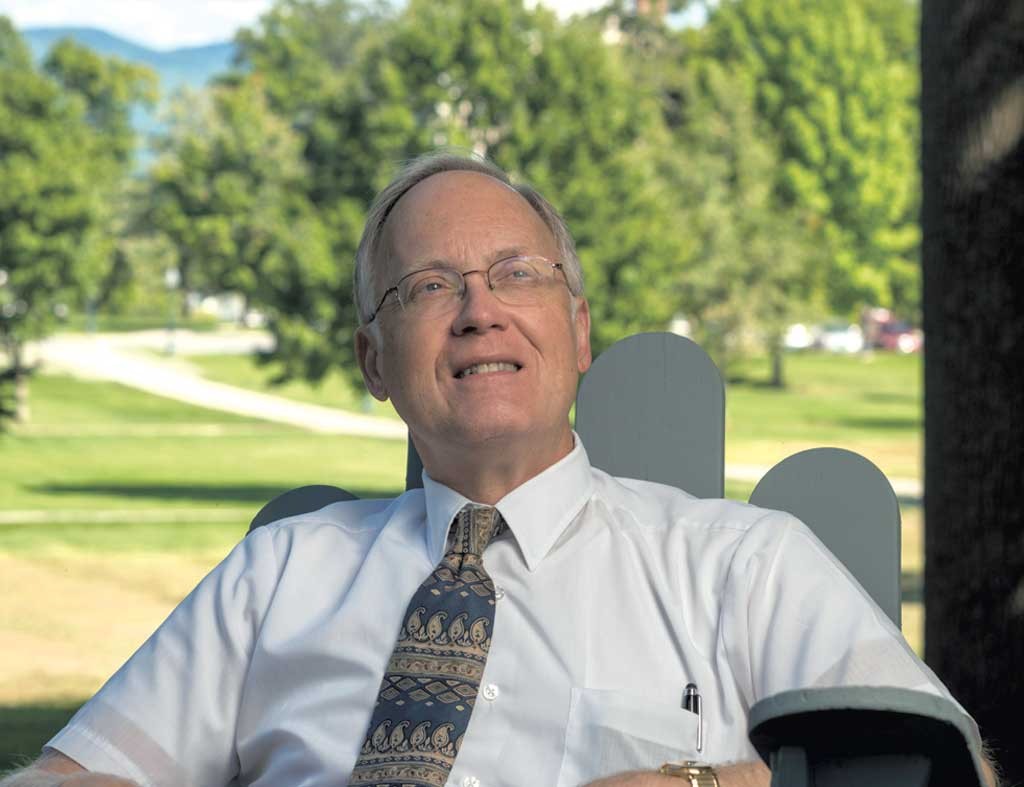Published September 3, 2014 at 10:00 a.m.
The Ohio National Guard's fatal shooting of four unarmed Kent State University students roiled Middlebury College in May 1970.
The morning after, Vietnam War protesters called for a student strike on the Vermont campus. Two days after that, a student broke into Recitation Hall, where Middlebury's Reserve Officers' Training Corp had held classes, and torched the place.
Absent from the unrest was a tubby sophomore from Massachusetts with slick, parted hair and oversize glasses. Earlier that year, Jim Douglas had won the chairmanship of the College Republicans, a position that would introduce him to the state's GOP brass and even a young Karl Rove, then executive director of the national CR.
Far from protesting President Nixon's Cambodian incursion, Douglas set up a table outside the dining hall to collect signatures in support of it. Recognizing Middlebury's liberal bent, he stationed a shaggy Republican at the table with a poster reading, "SIGN HERE FOR PEACE." Only in illegible lettering on the petition itself was it clear that the peace the young Douglas sought was through expansion of the war.
"It would be a profound understatement to say that being a Republican on the campus of a liberal arts college was a challenge in those days," Douglas writes in his new memoir, which comes out Wednesday, September 3.
As its subtitle suggests, the book chronicles the unlikely journey of a man who found considerable political success in a world that never quite mirrored his own philosophical leanings.
Contributing to that success was impeccable timing. When a state representative from Middlebury retired during Douglas' senior year of college, he seized the opportunity and won his first election at the tender age of 21. Three decades later — after stints as House majority leader, secretary of state and state treasurer — he would claim the governorship just as Vermont's century-and-a-half era of Republican relevance was coming to a decisive close.
"For anyone who wants to know about the second half of 20th-century Vermont history, this will be a must-read book," said Chris Bray, an Addison County state senator whose firm, Common Ground Communications, is publishing it — a first book for the company.
Bray's right. Thorough, thoughtful and well researched, Douglas' tome will surely become indispensable to the Vermont history buff and the political obsessive.
It may find less purchase with the general reader, uninterested in learning about Douglas' service on the Vermont House's 1973 Dress Code Committee or the finer points of his "fifteen-part plan to jump-start our state's economy."
In an interview last week, Douglas said that Bray had helped him cut about a third of the original manuscript, noting, "It probably wouldn't excite the reader to learn how I reorganized the filing system in the secretary of state's office."
But in the nine pages he does devote to his 12-year tenure in that office, Douglas still manages to include a lengthy, snooze-worthy discourse on his overhaul of the Office of Professional Regulation. In preparing the memoir, he writes, he "reviewed every weekly schedule that was posted during my eight years in [the governor's] office" — and it shows.
Worse yet are the governor's frequent lapses into the banal, boilerplate prose of campaign cliché.
"Even in difficult budgetary times," Douglas informs the reader, "it's still important to invest in the bricks, mortar, and wires that allow systems and societies to function."
"Our future depends on a shared commitment to do what's right," he writes, adding later, "Nothing is more important than our children."
Riiiiiight.
Here and there, Douglas' trademark charm and droll delivery shine through the worn-out talking points. Yes, his puns are occasionally wince-worthy, like when he recounts meeting his wife, Dorothy, at the dentist's office: "It was, well, love at first bite!"
But Douglas' embarrassing-dad-with-the-hiked-up-pants shtick has always proved endearing, and it remains so here — even when he writes about his daring first exposure to ... coffee!
"I had never tried it before, but, hey, I had to be one of the guys!" he writes.
Among the few juicy tidbits in the book is the revelation that, in the spring of 2009, Douglas "received an inquiry from a high-ranking official in the Obama administration asking if [he] might be interested in a presidential appointment."
Turns out, the position was just a midlevel ambassadorship, and Douglas eventually declined that and one other White House overture: to serve as a roving ambassador for public health.
When the ex-gov sat down to write in late 2011, he said last week, he felt "unburdened by the need to be gubernatorial or stay within the bounds that I confined myself to when I was in office."
"I'm not going to run for anything anymore, except for town moderator, perhaps, so I can say what I think," said Douglas, 63, who has served as a scholar-in-residence at Middlebury College since leaving the governor's office in early 2011.
But, like most political memoirists, Douglas can't quite lay down his armor and tell us how it really was. The book, after all, is an exercise in legacy building, so he still sticks close to the script.
In a chapter on his ill-fated, 1992 run against Sen. Patrick Leahy (D-Vt.), for instance, Douglas claims he entered the race because he "became concerned about the connection between money and politics."
"[O]ur senior U.S. Senator, Patrick Leahy, had amassed ninety-six percent (!) of his campaign war chest from outside Vermont," he writes. "How could he possibly represent us? I decided that we needed someone who would work first and foremost for Vermonters."
That's a hard rationale to swallow, not least because of his subsequent vetoes of a pair of campaign-finance-reform bills that would have limited "the connection between money and politics." More likely, Douglas saw a political opportunity and, like any good politician, seized it.
Douglas devotes plenty of ink to the petty slights he has suffered over the years and, apparently, hasn't gotten over. Organizers of the Northfield Labor Day parade, he writes, allowed the governor but no other politicians to march in it during Howard Dean's administration. After Douglas was elected, even governors were barred.
"The timing of the policy was odd, but I was willing to oblige and sat on the reviewing stand. Regrettably, others weren't so agreeable," he writes. "One year at least two politicians marched in violation of the rules. It was disappointing that, having established such an unusual restriction, the parade officials declined to enforce it."
God forbid!
Surely many of those who pick up The Vermont Way will give it the old "Washington read." That is, they'll flip to the index to see what Douglas wrote about them.
Regrettably — one of those annoyingly passive words Douglas dispenses liberally — the ex-governor frequently fails to identify the targets of his most withering criticism, referring obliquely to a "a reporter" or "a legislator."
"I often thought about the tone and what's appropriate," he explained last week. "I wanted not to be too sharp, but at the same time to make my points."
Douglas doesn't always hold back. He lets loose on liberal advocacy groups such as the Vermont Public Interest Research Group and, especially, the Conservation Law Foundation.
"I was once asked to identify the single greatest obstacle to prosperity in Vermont," he writes. "Without hesitation I said, 'the CLF.'"
Their lawyers, he posits, "have very lofty opinions of themselves" and "their focus is to harass and litigate."
Douglas heaps praise on Democrats who share his fiscal conservatism, such as Dean, and those with whom he could negotiate, such as Congressman Peter Welch (D-Vt.), who helmed the state Senate early in Douglas' gubernatorial tenure.
He thinks less of House Speaker Shap Smith (D-Morristown), who "seemed like a nice guy" but diminished the legislature's spirit of independence by demanding obedience from his Democratic supermajority.
The politician Douglas appears to revile the most is the man who would succeed him: Gov. Peter Shumlin. In the interview, Douglas said he intended to respect tradition and refrain from criticizing his successor's gubernatorial record, but he thought Shumlin's stint as Senate president was fair game.
Unlike Welch, who Douglas believes was "results-oriented" and "wanted to accomplish something," Shumlin "was, well, quite another story."
"He was very public about his dyslexia, and he once suggested it explained his inconsistencies. No matter what he said, it was likely to change in the next conversation," Douglas writes. "I have no idea what really motivates him. He once mentioned that I had been overheard saying that I missed Peter Welch. 'Was that true?' he wondered. I just smiled."
Coming in for just as harsh a critique is Vermont's news media, which Douglas sees as unforgivably biased and always out to get him. He wonders, for instance, why more letters to the editor appeared to favor his political opponents.
"[T]he editors may have chosen to publish more from the other side," he writes. "They claim otherwise, insisting that the letters on both sides of an issue or campaign are printed in proportion to the number they received. I always wondered, though, if a paper that endorsed me might have weighted the letters in the other direction to appear more balanced."
Douglas twice mentions a poll the Burlington Free Press commissioned just days before he defeated then-lieutenant governor Doug Racine in the 2002 gubernatorial race. Not only did the poll show him 10 points behind, but an unnamed reporter/columnist — clearly Sam Hemingway — predicted he would lose by six.
"After this, I became increasingly skeptical of those in the media who never left their urban offices, but made prognostications as if they knew what they were talking about," he writes.
Douglas claims that a doctor once told him he had "very thick skin." But given how much he dwells on specific editorials penned a decade ago or more, that doesn't seem to be the case.
Three newspapers come in for particular scorn: the Rutland Herald, the Addison County Independent and, you guessed it, Seven Days.
The late Seven Days political columnist Peter Freyne and his successor, Shay Totten, Douglas writes — though he identifies neither by name — "wrote the most bizarre and unpleasant pieces about me and other political figures."
"I stopped reading the paper and my stress levels declined immediately," he writes.
Douglas claims to have done the same with the Independent, his hometown newspaper, after publisher Angelo Lynn took him to task in a series of editorials.
"Finally, Dorothy had enough," he writes. "She proclaimed that the paper wasn't coming into our home anymore, so we allowed our subscription to expire. As with Seven Days, my staff would let me know if there was anything in the Independent that I really needed to know."
Douglas' grudges seem to last. Asked last week if his opinion of Seven Days had changed, the ex-governor said, "To be perfectly honest, I haven't read it in years, so I don't have any basis on which to offer any comparative view."
Douglas appears particularly stung by the Herald's condemnation of his 2009 veto of a bill legalizing gay marriage, which the Democratic legislature subsequently overrode.
"The paper long supported expanding privileges for gays, but was unable to respect those who held a different point of view on the topic," he writes.
That veto will forever contradict Douglas' self-assessment as an avowed moderate who cared more about creating jobs than engaging in the culture war. Accordingly, he spends just two pages on the topic — halfheartedly defending, but never really explaining, his veto. (Similarly, he spends nine pages on Vermonters' service in Afghanistan and Iraq, but he never addresses his support for the latter war. He also gives short shrift to the Vermont Yankee nuclear power plant.)
"I have no objection to those of the same sex forming a relationship," he writes. "Many have, and Dorothy and I have gay friends."
Really? The old "I have gay friends" line?
"I believe, however, that the institution of marriage is worth preserving in its traditional form," he continues. "The civil union law gave gay couples the same privileges as married folks in the eyes of the state; this new proposal was really a debate over nomenclature."
Douglas repeatedly questions why gay marriage supporters can't seem to respect his point of view, but he appears clueless about how offensive many will find his assertion that the extension of civil rights to gay people is just "a debate over nomenclature."
Throughout The Vermont Way, Douglas demands more from his ideological adversaries than he does from himself. When his opponents air attack ads, they are demeaning democracy, but when he runs ads calling Racine a flip-flopper and highlights the fact that Racine is "divorced and childless," he is simply "drawing a distinction."
When Douglas focuses on health care reform, he's taking a sober-minded approach to tackling the state's fiscal problems. But when President Obama does the same, Douglas is mystified.
"Frankly, I don't understand why the president deemed this his top priority," he writes of the Affordable Care Act. "I guess he had constituencies to satisfy..."
In Douglas' eyes, that's simply not the Vermont way.
The original print version of this article was headlined "Douglas Dishes"
douglas on
Gov. Peter Shumlin: "No matter what he said, it was likely to change in the next conversation. I have no idea what really motivates him." (p. 163)
The Conservation Law Foundation: "Along with their confederates at the Vermont Law School, they have impeded just about every major development in the state in the last few years. They try to stop everything; apparently, they want Vermont to become one huge park. I don't know who they think will be around to pay for its maintenance." (p. 213)
George W. Bush: "Dinner with 'Dubya' was always an adventure ... Although we didn't always see eye to eye on matters of public policy (as governor, I even sued him a few times!), I'm proud to call him my friend." (pp. 315-17)
Sen. Bernie Sanders: "With his booming voice and thick Brooklyn accent, Bernie can stir up a crowd. I'll bet he could order a sandwich and generate thunderous applause." (p. 307)
Seven Days: "Seven Days isn't a real newspaper... I stopped reading the paper and my stress levels declined immediately." (p. 290)
President Barack Obama: "Only upon assuming the presidency did he hold an executive branch position, and I think his inexperience was apparent." (p. 324)
House Speaker Shap Smith: "He seemed like a nice guy, but he also kept his troops in line." (p. 163)
The Rutland Herald: "The Mitchells [who own the paper] have been community minded and supportive, but they give their editors free rein, and the staff wrote a number of outrageous editorials in my later terms." (p. 292)
U.S. House Minority Leader Nancy Pelosi: "The next statement will shock some of my GOP friends, so brace yourselves: I like Nancy Pelosi." (p. 266)
More By This Author
Speaking of...
-

Bernie Sanders Sits Down With 'Seven Days' to Talk About Aging Vermont
Apr 3, 2024 -

Video: Jen Ellis Writes ‘Bernie’s Mitten Maker,’ a Book About the Power of Crafting
Apr 20, 2023 -

Book Review: 'Pig Years,' Ellyn Gaydos
Oct 19, 2022 -

Al Franken Blends Satire and Political Commentary at Flynn Show
Sep 19, 2022 -

Candidates for Governor Display Stark Differences at Tunbridge Fair Debate
Sep 16, 2022 - More »
Comments
Comments are closed.
From 2014-2020, Seven Days allowed readers to comment on all stories posted on our website. While we've appreciated the suggestions and insights, right now Seven Days is prioritizing our core mission — producing high-quality, responsible local journalism — over moderating online debates between readers.
To criticize, correct or praise our reporting, please send us a letter to the editor or send us a tip. We’ll check it out and report the results.
Online comments may return when we have better tech tools for managing them. Thanks for reading.















































